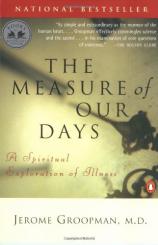Reading Group Guide
Discussion Questions
The Measure of Our Days

1.In what ways has facing death even temporarily improved the lives of the patients profiled here?
2. What makes a good doctor? Compassion? Good medical decisions? Being up on the latest research? Which is the most important of these traits? What other traits are important?
3. A deeply spiritual person, Groopman draws from his religious background in treating his patients. How does this added dimension enhance his medical knowledge?
4.Groopman grew up with the specter of the Holocaust and the damage it did to members of his family. How do you think this legacy of physical and emotional suffering prepared him for a life in medicine? What about the effect of his father's death of a heart attack in front of him while Groopman was still a medical student?
5. In Kirk's story, Groopman asks the question "How rational can our decisions be when we are desperate and feel unprepared to die?" (pp. 18-19) Does the doctor ever have a responsibility to assert his or her will over that of the patient? What should be taken into consideration before a doctor allows a patient to do something that is not medically advisable?
6.What do you think of Cindy's decision to bear a child even though she has AIDS? Was it wrong for her to risk the health of her future child, or does the desire for children, and the certainty that they will be cared for, outweigh that risk? Does she, as an AIDS victim, have the right to bear a child?
7. What do you think of the way Groopman handled Debbie's resistance to radiation therapy? Should he have been more forceful in trying to convince her that it was necessary to her recovery, or does he have a stronger responsibility to honor her belief system?
8.Discuss, in light of the recent controversy over assisted suicides, the plight of Alex, who asked to be allowed to die when he was actually only suffering from an allergic reaction to a drug situation that could be, and was, easily reversed. Does the potential for these types of situations justify the prohibition of assisted suicides?
9. In Elliott's story, Groopman refers to his "choosh," a Yiddish word for a feeling that emanates from the spirit that Elliott will survive his cancer. Does this kind of intuitive, rather than practical, prognosis have a place in medicine? Why or why not?
10. Groopman writes, "There is magic and intimacy in the moment when death appears defeated. It envelops the patient and his doctor in an almost mystical embrace. A powerful force, the force of reclaimed life, flows between you." (p. 97) Death is a force as well; should we avoid it at all costs? When is death the natural, and correct course? Groopman has taken steps to educate himself in the theories and practice of alternative medicine. Does this enhance his effectiveness as a doctor of traditional western medicine?
The Measure of Our Days
- Publication Date: October 1, 1998
- Paperback: 242 pages
- Publisher: Penguin (Non-Classics)
- ISBN-10: 014026972X
- ISBN-13: 9780140269727






